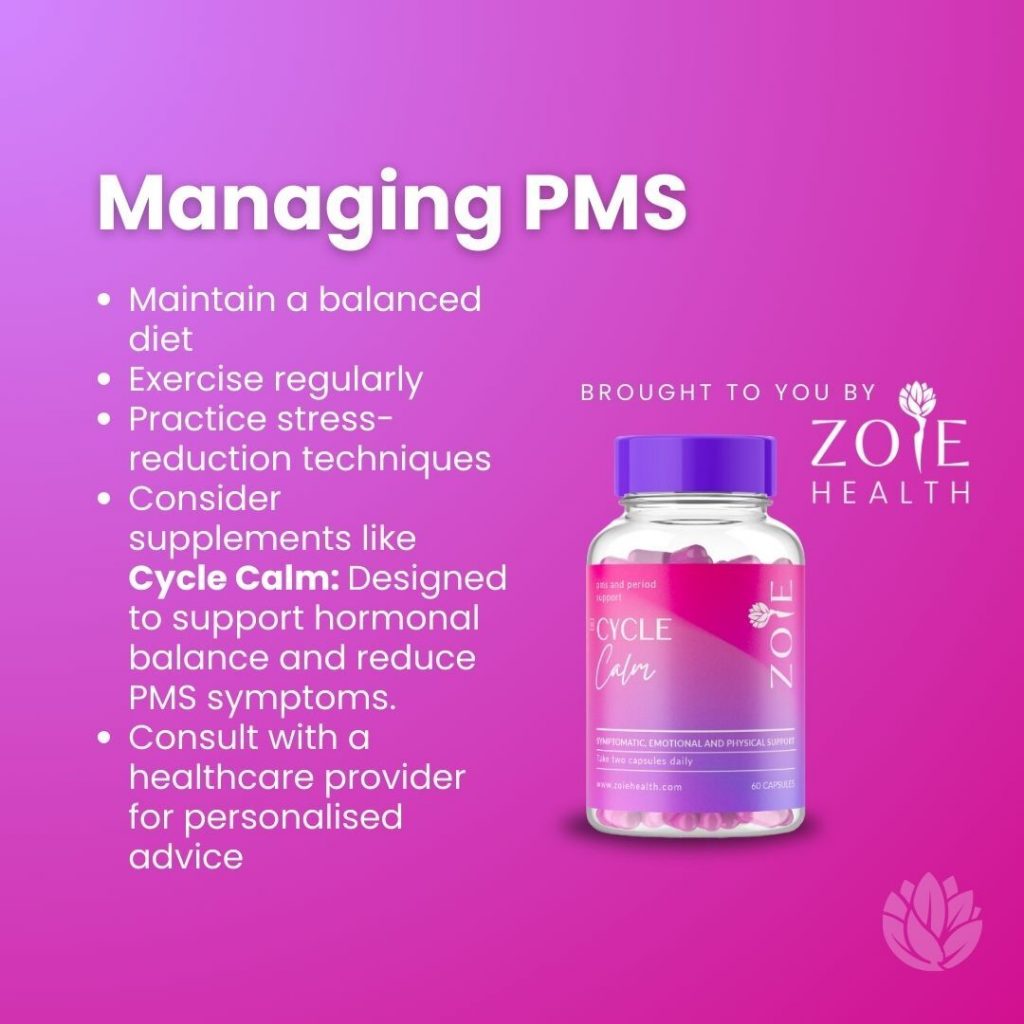By Ammarah Seedat
Premenstrual Syndrome (PMS) is something many women experience, yet it can feel different for everyone. Whether you face mild discomfort or find it significantly impacting your daily life, understanding PMS and finding ways to manage it can make a world of difference. Let’s dive into what PMS is, what causes it, and how you can find effective relief.

What is PMS
PMS, or Premenstrual Syndrome, refers to a variety of symptoms that occur in the days leading up to your period. These can include physical discomfort like bloating and cramps, as well as emotional changes such as mood swings or irritability. Typically, these symptoms start after ovulation and continue until your period begins. While it’s a common experience, the severity and impact of PMS can vary greatly from one person to another.
Recognising the Symptoms of PMS
PMS can manifest in many ways, and it’s important to recognise the signs so you can take steps to manage them. Here are some of the most common physical symptoms of PMS:
- Bloating and cramping
- Sore and swollen breasts
- Acne flare-ups
- Headaches and muscle pain
- Fatigue
On the emotional side, you might notice:
- Increased anxiety or restlessness
- Irritability or mood swings
- Feelings of sadness or depression
- Changes in sleep patterns
- Food cravings, particularly for sweets
- A decrease in sex drive
These symptoms often follow a predictable pattern, appearing in the days before your period and easing once menstruation begins.
What’s Normal and What’s Not in PMS?
It’s perfectly normal to experience some discomfort or mood changes before your period, but it’s essential to differentiate between typical PMS symptoms and those that may require more attention. Normal PMS symptoms include mild bloating, cramps, and mood changes that don’t severely disrupt your life.
However, if you experience PMS symptoms that are intense enough to interfere with your daily activities—such as severe depression, anxiety, or physical pain—you may be dealing with something more serious, like Premenstrual Dysphoric Disorder (PMDD). If your symptoms are this severe, it’s crucial to speak with a healthcare provider.
Read More: Is this normal? Period FAQs and their answers
Understanding the Causes of PMS
The exact cause of PMS isn’t fully understood, but several factors are thought to contribute:
- Hormonal Fluctuations: The ups and downs of hormones like oestrogen and progesterone throughout your menstrual cycle are likely key players in PMS. These fluctuations can affect both your physical and emotional wellbeing
- Brain Chemistry: Changes in neurotransmitters like serotonin, which help regulate mood, may also play a role in PMS. A drop in serotonin levels, for instance, is linked to feelings of sadness and irritability.
- Existing Mental Health Conditions: If you have a history of mental health issues, such as depression or anxiety, you may notice these conditions worsen during your menstrual cycle, leading to more pronounced PMS symptoms.
- Lifestyle Factors: Your daily habits can impact the severity of your PMS. Smoking, a diet high in sugar and fat, lack of exercise, and poor sleep are all factors that can make PMS worse.
PMS vs. PMDD: What’s the Difference?
While PMS is common, PMDD (Premenstrual Dysphoric Disorder) is a more severe form that affects about 3-8% of menstruating women. PMDD includes the same symptoms as PMS but with greater intensity, particularly in terms of emotional and mood-related symptoms. If you’re experiencing severe mood swings, depression, or anxiety that disrupt your daily life, it’s important to seek medical advice, as PMDD often requires a more comprehensive treatment approach.
Read More: PMDD: What is it exactly?
Diagnosing PMS
To diagnose PMS, healthcare providers typically look for a pattern in your symptoms over a few menstrual cycles. You may be asked to track your symptoms to see if they consistently occur before your period and resolve once it begins. Since some other conditions, like thyroid disorders or chronic fatigue syndrome, can mimic PMS, your doctor may also conduct tests to rule out these possibilities.
Finding Relief: Your Go-To Strategies for PMS
While there’s no cure for PMS, there are several effective strategies to help manage your symptoms and improve your quality of life.
- Lifestyle Changes:
- Diet: Eating smaller, more frequent meals can help reduce bloating. Cutting back on salt, sugar, caffeine, and alcohol can also make a big difference. Focus on a balanced diet rich in fruits, vegetables, and whole grains.
- Exercise: Regular physical activity, such as walking or cycling, can relieve stress, improve your mood, and ease physical symptoms like cramps.
- Stress Management: Techniques such as yoga, meditation, and deep-breathing exercises can help you manage the emotional symptoms of PMS.
- Medications:
- NSAIDs: Over-the-counter pain relievers like ibuprofen can be effective for cramping and breast tenderness.
- Hormonal Contraceptives: Birth control pills can help regulate or even stop ovulation, which may reduce PMS symptoms.
- Supplements:
- Zoie Health PMS and Period Supplement Bundle: This bundle is your hero solution for tackling PMS symptoms head-on. Designed with your needs in mind, it includes Cycle Calm, Bye, Bye Bloat , and Energy Essence. These supplements are packed with key nutrients like magnesium, calcium, and vitamin B6, which are known to reduce cramps, improve mood, and combat fatigue. Incorporating this bundle into your daily routine can help you manage PMS symptoms and support your overall menstrual health.
- Alternative Treatments:
- Acupuncture: Some women find relief from PMS symptoms with acupuncture, though scientific evidence is still limited.


When to Seek Help for PMS
If PMS is taking a toll on your daily life, it’s important to talk to a healthcare provider. They can help you determine whether your symptoms are related to PMS, PMDD, or another condition, and guide you towards the right treatment.
Conclusion
PMS is a real and often challenging experience, but with the right strategies, you can manage your symptoms and maintain your quality of life. Whether through lifestyle changes, medications, or the Zoie Health PMS and Period Supplement Bundle, you have options to help you feel your best. If self-care measures aren’t enough, don’t hesitate to seek support from a healthcare professional. You deserve to feel empowered and in control of your health every day of the month.
About Zoie Health
Zoie Health is at the forefront of women’s wellness, offering quality, affordable, and accessible supplements tailored to the unique health needs of women. With a focus on synergy, Zoie Health’s products are designed to work together, providing your body with the comprehensive support it needs to thrive. With our online Zoie Shop and Pharmacy, our unique virtual consultations, and vast communities of women, we strive to provide good quality healthcare to underserved populations.
Sources: Cleveland Clinic, Healthline









